Outsourcing as a Strategic Growth Engine
In today’s pharmaceutical landscape, efficiency and scalability are essential. That’s where generic pharmaceuticals contract manufacturing comes in. Pharmaceutical companies are increasingly outsourcing production to third-party manufacturers to streamline operations, cut costs, and meet global demand. This model allows companies to focus on core competencies like R&D and marketing while leveraging expert manufacturing capabilities across the globe.
Accelerating Growth with Global Demand for Generics
The worldwide push for affordable medications is driving the need for generic drugs, and with it, contract manufacturing services. As patents for branded drugs expire, there’s a race to produce equivalent generics at scale. Many companies lack the infrastructure or resources to manufacture high-quality products in large volumes, leading them to partner with contract manufacturers. These partners bring in state-of-the-art facilities, regulatory knowledge, and streamlined logistics networks to get generics to market faster and more efficiently.
Key Benefits of Contract Manufacturing in Generics
The generic pharmaceuticals contract manufacturing market offers several advantages. First and foremost, it reduces capital investment. Building and maintaining pharmaceutical manufacturing facilities is expensive. Outsourcing allows companies to avoid these costs while gaining access to experienced teams and compliant infrastructure. Moreover, contract manufacturers often possess international certifications, enabling partners to enter new markets more easily and with fewer regulatory hurdles.
Another major benefit is speed. Contract manufacturing organizations (CMOs) specialize in fast turnaround times, which is critical when launching generics after a patent expires. The quicker a generic hits the shelves, the more competitive edge it gains in pricing and availability.
Leading Segments and Market Dynamics
Among the most in-demand services are solid dosage form production, sterile manufacturing, and packaging. With oral solids like tablets and capsules being the most common form of generics, manufacturers offering these capabilities are seeing substantial demand. CMOs are also expanding their service offerings to include formulation development and analytical testing to become end-to-end solution providers. The contract manufacturing of generic pharmaceuticals is especially booming in countries like India, China, and Brazil, where low manufacturing costs meet high regulatory standards.
Challenges and the Road Ahead
While the market is booming, it’s not without challenges. Ensuring consistent quality, navigating strict compliance requirements, and maintaining intellectual property security are ongoing concerns. However, the future looks optimistic. Advancements in automation, AI-driven quality assurance, and global harmonization of standards are improving trust and transparency in outsourcing relationships.
Looking ahead, the market is expected to evolve further as more companies seek flexible, cost-effective manufacturing models. The demand for biosimilar contract manufacturing is also emerging as a key growth area, indicating a shift beyond traditional generics into more complex drug categories.



